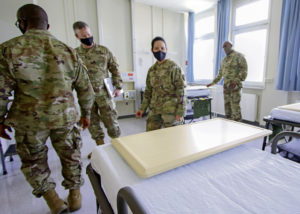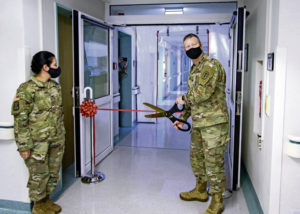
As restrictions begin to lift across Europe and within U.S. military installations, Landstuhl Regional Medical Center continues to prepare for the possibility of more patients in light of COVID-19 with the opening of a new intensive care ward, May 8.
The new ward, known to staff as 10C, was originally intended to replace the current medical-surgical ward that is primarily used for postoperative patient recovery and care. With the onset of COVID operations, LRMC leaders decided to expedite the opening of 10C to serve as a swing ward capable of receiving overflow patients from the Intensive Care Unit, Medical-Surgical Ward and COVID ICU.
“We’ve been working on 10C since 2017, and it cost about a million dollars to renovate,” said U.S. Army Col. Elba Villacorta, Deputy Commander for Inpatient Services at LRMC. “When COVID came around, we decided to expand our current intensive care ward capabilities by keeping both the current ICW and 10C open at the same time.”
The new ward is stocked with upgraded infrastructure, improved configuration, new monitoring systems, new isolation rooms and built-in oxygen capabilities.
“This is an older facility, but now we have an updated ward where we can treat both our lower acute patients, and any COVID patients as well,” said Villacorta. “In the event we reach maximum capacity in our current COVID ICU, 10C can be diverted to a COVID ward where we can resort to one-way entry flow and stand up the protective barriers for staff and patient safety.”

For U.S. Army Master Sgt. Marshall Crawford, Noncom-missioned Officer in Charge for Inpatient Services, the incredible support of the LRMC’s Facilities Management and Logistics Divisions were paramount to the opening of 10C.
“Facilities and Logistics (divisions) displayed heroic efforts in standing up the ward,” he said. “This ward wasn’t supposed to open for another several months, but they were able to divert resources to get the ward up in a month.”
In terms of the overall benefit of the 10C ward, Crawford believes the additional space will enable LRMC to continue its mission of providing wartime care for ill, injured and wounded warfighters, while also treating COVID-positive patients.
“We don’t want to mix COVID patients with general patients, and we still have a wartime mission going on,” said Crawford. “Having a COVID unit allows us to care for them in a separate environment without putting our wartime missions at risk.”


